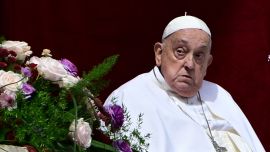“We’re at a unique moment in the history of humanity with a single issue which has suspended time, changed the future, concentrated all our efforts solely on the present and made all past differences seem insignificant.”
That is how Perfil’s unusual interview with President Alberto Fernández began. Unusual for being the longest he has given but also given Editorial Perfil’s controversial history with Kirchnerism, which, unlike Clarín and La Nación, did not begin with the conflict with the farmers, after which Alberto Fernández resigned as Cabinet chief, but from the moment Néstor Kirchner took office in 2003 while Alberto Fernández was personally managing policy.
Editorial Perfil is known to have been the only Argentine media company which received zero national state advertising during the five years that Alberto Fernández was Cabinet chief. Néstor Kirchner, as president, told Joaquín Morales Solá (as was published in his column in the newspaper La Nación) that he got on well with all journalists and media except one, mentioning Perfil and me.
But in the face of the difficulties being experienced by the country with the coronavirus crisis and the incalculable losses from the economic consequences of the necessary measures taken to reduce the number of victims, as I told the president at the beginning of the interview, our past differences become petty. Today all our strength must be concentrated on surmounting what could be our biggest economic challenge ever, even bigger than that of public health.
This interview was inspired by the same anti-grieta spirit which we preached throughout all the years of the Macri government, as in the years when the grieta reached its paroxysm during the government of Cristina Fernández de Kirchner. And given the public track record of the bad relationship which separated us, it was also conceived as a special message of unity in this moment of crisis, which obtained, in reply, the same inclination from the president.
As happens in all confrontations, when the two sides approach, they also discover what they have in common. In my particular case, a similar admiration for Raúl Alfonsín and the social democratic ideas which led a young Alberto Fernández of 26, a recent law graduate, to approach the Editorial Perfil newsroom to be a permanent columnist in El Diario del Juicio, a publication which during the trial of the military dictatorship juntas transcribed the complete testimony of all the witnesses at the Federal Appeals Court in a pre-digital age when it was feared that the return of another dictatorship would destroy the official files.
The conflict between Kirchnerismo and Editorial Perfil is ancient history. Today, Argentina faces long months of an unprecedented social cost which will require much wisdom in order to maintain the peace. Even with the government helping to pay salaries, many companies will shut down and those which remain will be significantly reduced. Even if the government prevents dismissals, many people will be jobless and those who remain will see their income reduced. A chain breach of contracts and other conditions pre-existing the coronavirus crisis emergency will peak some months after the peak of infections and deaths.
As a lawyer, the president used in this interview the phrase “force majeure,” the legal coverage for the impossibility of complying with obligations. But beyond the courts being able to exempt almost any non-compliance from responsibilities, nothing will be able to exempt people from the enormous pain which will be suffered.
Coronavirus is a physically democratic disaster which attacks everybody alike, economically too. In the many terminal crises which Argentina has suffered, there were those who turned them to their favour by getting out in time and returning stronger afterwards compared to the losses of everybody else. But this time nobody will come out of this immune - those who have least will suffer the most but even the richest will have moments of anxiety.
This democratisation of misfortune could have, as a positive effect, the need to heal the scars inflicted during previous conflicts, in order to be able to face together the new injuries which this crisis will inevitably produce for everybody. Just as coronavirus has demonstrated global interdependence, so it is making evident our local interdependence. In this interview with the president, the reader will not find any reproach of the claims Editorial Perfil has to make against the Kirchner government and its Cabinet chief but a search for a deeper mutual understanding, coming out of the cycle, without aiming for a scoop, a headline or a controversy.
A media interview with a president should not be anything uncommon. But in this case the interview means something more. It is a measure of the scale and gravity of the crisis which the country is undergoing, reducing the past to insignificance.
May it also be a signal of something permanent for a future we have no way of knowing.




















Comments